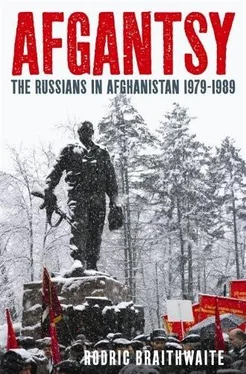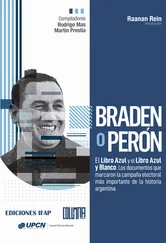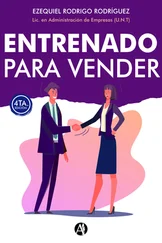29 Lyakhovski, Tragedia i doblest Afgana , 2009, pp. 984–90.
30 Arkadi Dubnov, interview, Moscow, 29 May 2007.
31 President Putin in a 2002 interview for Brook Lapping’s BBC television series Iran and the West , first broadcast in February 2009.
32 Lyakhovski, Tragedia i doblest Afgana , 2009, p. 998. Private information.
33 Pir Said Ahmad Gailani, interview, London, 22 July 2008.
34 The last stand of the 12th zastava is described at http://wolfschanze.livejournal.com/tag/%D0%93%D0%A0%D0%9F%D0%92%D0%A2and http://kua1102.1ivejournal.com/38687.html. The links were kindly given to me by Oksana Antonenko.
14: A Land Fit for Heroes
1 V. Ogryzko, Pesni afganskogo pokhoda (Moscow, 2000), pp. 146, 20, and 151.
2 W. Odom, The Collapse of the Soviet Military (New Haven, Conn., 1998), p. 259.
3 R. Braithwaite, Across the Moscow River (New Haven, Conn., 2002), p. 138.
4 G. Murrell, Russia’s Transition to Democracy (Brighton, 1997), p. 61; Braithwaite, Across the Moscow River , p. 146.
5 V. Varennikov, Nepovtorimoe , 7 vols. (Moscow, 2001), Vol. 5, p. 230.
6 The following account is taken from ibid., pp. 192 et seq.
7 Alexander Lyakhovski, interview, Gelendzhik, 19 September 2007.
8 Ogryzko, Pesni afganskogo pokhoda , p. 161.
9 Igor Morozov, interview, Moscow, 11 March 2010.
10 David Lloyd George, speech at Wolverhampton on 23 November 1918, reported in The Times , 25 November 1918.
11 D. Gai and V. Snegirev, Vtorzhenie (Moscow, 1991), p. 253.
12 M. Galeotti, Afghanistan: The Soviet Union’s Last War (London, 1995), p. 74.
13 Komsomolskaya Pravda , 21 December 1989, quoted in N. Danilova, Rasplata za dolg: Politika i kollektivnye deistvia veteranov voiny v Afganistane (unpublished), Chapter 2.
14 Danilova, Rasplata za dolg , Chapter 2.
15 Komsomolskaya Pravda , 22 July 1990, quoted ibid.
16 Galeotti, Afghanistan , p. 76.
17 V. Znakov, ‘Psikhologicheskie prichiny neponimania afgantsev’, quoted in Danilova, Rasplata za dolg , Chapter 2.
18 Galeotti, Afghanistan , pp. 123–5.
19 A. Kotenov, Neokonchennaya voina ( http://www.rsva.ru/biblio/prose_af/unfinished_war/index.shtml); ( http://kotenev.chat.ru/).
20 Gazeta.Ru, 12 June 2007 ( http://gzt.ru/incident/2006/11/12/220000.html).
21 N. Danilova, ‘Veterans’ Policy in Russia: a Puzzle of Creation, Journal of Power Institutions in Post-Soviet Societies , No. 6/7, 2007; ‘The Social and Political Role of War Veterans’ ( http://www.pipss.org/document873.html).
22 Federal Law No. 5- 3 of 12 January 1995.
23 OOOIVA website ( http://www.rfpi.ru/oooiva/index.php).
24 Information from Dr Rod Thornton, Nottingham University. He served as a sergeant in Bosnia and said that the death of children was the hardest of all things to take.
25 Web interview with Dr Matthew Friedman, Executive Director of the US Veteran Administration’s National Center for Post-Traumatic Stress Disorder ( http://www.pbs.org/wgbh/pages/frontline/shows/heart/interviews/friedman.html).
26 Web interview with Colonel Thomas Burke, Director of Mental Health Policy for the US Department of Defense ( http://www.pbs.org/wgbh/pages/frontline/shows/heart/interviews/burke.html).
27 ‘As a Brigade Returns Safe, Some Meet New Enemies’, New York Times , 14 July 2010.
28 A. Allport, Demobbed: Coming Home after World War II (New Haven, Conn., 2009), pp. 87, 109, 164, and 209.
29 Text at http://www.gr-oborona.ru/pub/rock/group.html.
30 Galeotti, Afghanistan , p. 152.
31 Alexander Gergel, email to author, 2 July 2009.
32 Special edition of Voronezhskaya Gazeta , 11 February 2009.
33 Yu. Zvyagintsev, ‘Afganski Izlom’, Vestnik ATN , August 1999.
34 S. Aleksievich, Zinky Boys (New York, 1992), pp. 185–94.
35 Moscow City website ( http://mos.ru/wps/portal/!ut/p/c0/).
36 ‘Afganski Sindrom dla SShA’, InfoRus , 14 February 2008 ( http://www.inforos.ru/?Id20566).
37 Alexander Yeshanu, email, 9 September 2009, posted on Artofwar.ru/.
1 N. Shilo, ‘Afganistan: 30 let spustya’ ( http://www.mgimo.ru/afghan/132585.phtml); article by Anatoli Kostyrya ( http://www.afghanistan.ru/doc/16256.html).
2 Oleg Bogomolov, interview, Moscow, 7 October 2004.
3 G. Krivosheev, Rossia i SSSR v voinakh XX veka: Poteri vooruzhennykh sil (Moscow, 2001), pp. 536–9.
4 A. Arnold, The Fateful Pebble (Novato, CA, 1993), pp. 188 et seq.
5 A. Seierstad, The Bookseller of Kabul (London, 2008), p. 150.
6 A. Kalinovsky, ‘A Long Goodbye: The Politics and Diplomacy of the Soviet Withdrawal from Afghanistan, 1980–1992’, PhD thesis, London School of Economics, 2009.
7 The documentary evidence is inevitably thin or non-existent. The lower figure was suggested to me by Dr Antonio Giustozzi. General Lyakhovski quotes a figure of 2.5 million, but gives no source; the figure is improbably high: A. Lyakhovski, Tragedia i doblest Afgana (Moscow, 2009), p. 1018.
8 For an extreme example of the belief that the United States actually won the Vietnam War, see P. Jennings, The Politically Incorrect Guide to the Vietnam War (Washington, DC, 2010).
9 ‘More bombs were dropped on Laos than by the US Army Air Force in Europe. This is also true for the RAF in Europe. Further, it is also accurate that Laos got more than both air forces dropped on Germany. But for all air forces (including tactical air) in all of Europe (including Med), WWII outdoes Laos by 2.4M tons to slightly over 2.0M tons’: John Prados, email to author, 26 April 2010.
10 For a discussion of casualty figures see Annex 4, ‘Indo-China, Vietnam, Algeria, Afghanistan: A Comparison’, p. 348.
11 L. Shebarshin, Ruka Moskvy: zapiski nachalnika sovetskoi razvedki (Moscow, 2002), p. 220.
12 V. Snegirev, ‘Nashi’, Rossiiskaya Gazeta , 2003.
13 See http://www.zharov.com/afghan/index.html.
14 ‘Yaroslavtsy v Afganskoi voine’ ( http://www.afghan-yar.msk.ru/page.php?Id104).
This book is based to a large extent on Russian sources. It draws on such documents as have been published, on many secondary sources, on the Internet, and on interviews with people who fought in Afghanistan or were connected with the events there in other ways.
There are no systematic or convenient sources for the Soviet war in Afghanistan to compare with those available for the Stalin period and the Great Patriotic War—the volumes of documents about the NKVD officially published by its successor, the Federal Security Service, for example, or the numerous volumes produced by the late Alexander Yakovlev and his Democracy Foundation.
However, a significant number of documents have seen the light of day, especially about the decision to invade Afghanistan and about the withdrawal nearly a decade later. One reason is that the military, in particular, were anxious to tell their side of the story. The generals immediately set down to write their own version of events in memoirs and histories, at a time when the archives were in a state of chaos, and access to them was much more open than it had been before, than it was to become later, and indeed than it normally is in most countries.
Other documents concerning the period 1985–91 have been published by the Gorbachev Foundation, notably the notes on the Politburo meetings of those years and the parallel diary of Anatoli Chernyaev, Gorbachev’s foreign policy adviser. Still more have been published by the Wilson Center in Washington, DC.
Читать дальше












